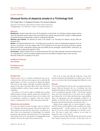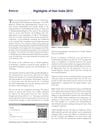 1 citations,
January 2022 in “Transgender health”
1 citations,
January 2022 in “Transgender health” Hormone therapy in transgender individuals can increase acne and affect hair growth and loss.
 7 citations,
August 2013 in “Journal of the European Academy of Dermatology and Venereology”
7 citations,
August 2013 in “Journal of the European Academy of Dermatology and Venereology” Less than a quarter of alopecia areata cases were unusual forms or had paradoxical regrowth.
 81 citations,
July 2011 in “Lasers in Medical Science”
81 citations,
July 2011 in “Lasers in Medical Science” The Lexington LaserComb helped regrow hair in mice with a condition similar to human hair loss.
 8 citations,
March 2019 in “Progress in Human Geography”
8 citations,
March 2019 in “Progress in Human Geography” Hair significantly shapes body identity and social interactions, influencing how we perceive and relate to our bodies.
 30 citations,
December 1999 in “International Journal of Dermatology”
30 citations,
December 1999 in “International Journal of Dermatology” Finasteride increases hair count in middle-aged and elderly men without causing sexual dysfunction.
 151 citations,
May 2014 in “American Journal of Clinical Dermatology”
151 citations,
May 2014 in “American Journal of Clinical Dermatology” Effective treatments for male pattern baldness include oral finasteride and topical minoxidil, while topical minoxidil is best for female pattern baldness.
 January 2009 in “Egyptian Journal of Medical Human Genetics”
January 2009 in “Egyptian Journal of Medical Human Genetics” The study suggests that a specific gene variation and higher gene activity are linked to increased baldness in Egyptian men.
May 2023 in “Clinical, Cosmetic and Investigational Dermatology” More personalized and effective treatments for androgenetic alopecia are needed.
 190 citations,
October 2002 in “The FASEB journal”
190 citations,
October 2002 in “The FASEB journal” Androgens may cause hair loss by increasing TGF-beta1 from scalp cells, which inhibits hair cell growth.
 68 citations,
March 1965 in “The BMJ”
68 citations,
March 1965 in “The BMJ” Hormones and genetics affect hair growth and patterns, with some changes reversible and others not.
 10 citations,
January 2009 in “Elsevier eBooks”
10 citations,
January 2009 in “Elsevier eBooks” Hair growth is influenced by hormones and goes through different phases; androgens can both promote and inhibit hair growth depending on the body area.
 209 citations,
September 2008 in “Dermatologic Therapy”
209 citations,
September 2008 in “Dermatologic Therapy” Androgens can both increase and decrease hair growth in different parts of the body.
January 2018 in “Archives of dermatology and skin care” Low level laser therapy may promote hair growth for patterned hair loss, but more research is needed.
 11 citations,
January 2001 in “Cambridge University Press eBooks”
11 citations,
January 2001 in “Cambridge University Press eBooks” Androgens can cause hair growth in some areas but hair loss on the scalp.
 8 citations,
July 2012 in “Cambridge University Press eBooks”
8 citations,
July 2012 in “Cambridge University Press eBooks” Androgens can both increase body hair and cause scalp hair loss.
 98 citations,
February 2007 in “Seminars in Cell & Developmental Biology”
98 citations,
February 2007 in “Seminars in Cell & Developmental Biology” Androgens can both stimulate and cause hair loss, and understanding their effects is key to treating hair disorders.
 1 citations,
January 2012 in “International Journal of Trichology”
1 citations,
January 2012 in “International Journal of Trichology” Hair India 2012 was a successful international event focused on combating fake trichology practices and discussing various hair health topics.
 46 citations,
December 1992 in “Journal of Investigative Dermatology”
46 citations,
December 1992 in “Journal of Investigative Dermatology” Minoxidil decreases LH expression, while hydralazine has mixed effects on prolyl and lysyl hydroxylase activities.
33 citations,
October 2016 in “Photomedicine and laser surgery” Future clinical uses of Intense Pulsed Light (IPL) are likely to grow and become more effective with new advancements and combined treatments.
 6 citations,
January 2017 in “Advances in Experimental Medicine and Biology”
6 citations,
January 2017 in “Advances in Experimental Medicine and Biology” Runx genes are important for stem cell regulation and their roles in aging and disease need more research.
 156 citations,
December 2012 in “Cell Stem Cell”
156 citations,
December 2012 in “Cell Stem Cell” TGF-β is crucial for controlling stem cell behavior and changes in its signaling can lead to diseases like cancer.
 17 citations,
May 2014 in “Naunyn-Schmiedeberg's Archives of Pharmacology”
17 citations,
May 2014 in “Naunyn-Schmiedeberg's Archives of Pharmacology” 7-Phloroeckol from brown algae may help hair grow.
 17 citations,
February 2013 in “PLOS ONE”
17 citations,
February 2013 in “PLOS ONE” 6-Gingerol, found in ginger, may slow down hair growth and could be used for hair removal.
 5 citations,
May 2021 in “International Journal of Cosmetic Science”
5 citations,
May 2021 in “International Journal of Cosmetic Science” Healthy scalp leads to better hair quality and less damage.
 66 citations,
August 2001 in “Experimental Dermatology”
66 citations,
August 2001 in “Experimental Dermatology” Human hair follicle cells can grow hair when put into mouse skin if they stay in contact with mouse cells.
 64 citations,
March 2005 in “Journal of Investigative Dermatology”
64 citations,
March 2005 in “Journal of Investigative Dermatology” Brain-Derived Neurotrophic Factor (BDNF) slows down hair growth and promotes hair follicle regression.
 51 citations,
January 2003 in “Hormone Research in Paediatrics”
51 citations,
January 2003 in “Hormone Research in Paediatrics” Hormones and their receptors, especially androgens, play a key role in hair growth and disorders like baldness.
 44 citations,
March 2004 in “Journal of Investigative Dermatology”
44 citations,
March 2004 in “Journal of Investigative Dermatology” The effects of estrogen on human hair growth are unclear and need more research.
 31 citations,
February 2014 in “Journal of dermatological science”
31 citations,
February 2014 in “Journal of dermatological science” Placental growth factor may help treat hair loss.
 22 citations,
November 2013 in “Clinical and experimental dermatology (Print)”
22 citations,
November 2013 in “Clinical and experimental dermatology (Print)” Ecklonia cava, a type of seaweed, may help hair grow.



























